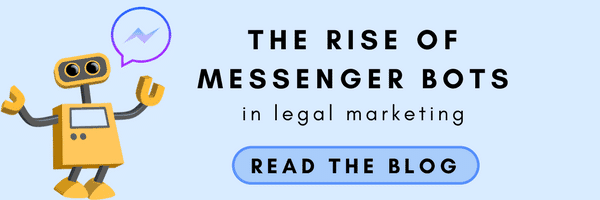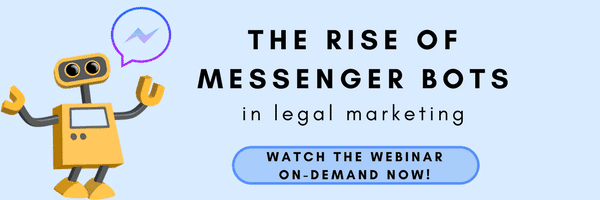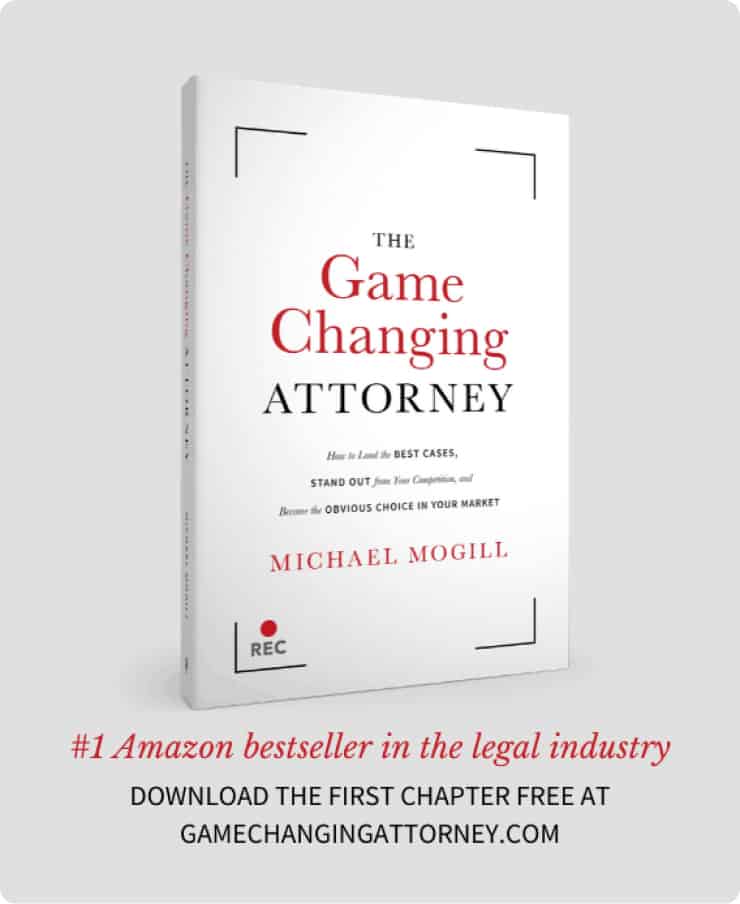The days of artificial intelligence being the exclusive domain of tech moguls are over – now, tools powered by artificial intelligence are present in almost every aspect of our lives: on the road, in our computers, in our shopping experiences, and most importantly – in our businesses.
Incorporating AI tools in your business can free up your time immensely; if you can automate once man-powered processes, you can refocus your energy and attention on other tasks. While some AI tools require extensive tech knowledge, there are now a plethora of ways you can use AI in your marketing strategy without having any knowledge of coding or computer science.
Perhaps the most accessible of these AI tools is the chatbot, a fairly basic integration that has the power to drastically improve your current client experience. Using chatbots in your firm’s client experience and marketing strategy can reduce friction and increase the likelihood that a potential client will reach out to your firm — consider how much easier it would be to book a case review through Facebook messenger immediately upon seeing an ad for your firm, rather than the traditional channels of navigating to your firm’s website, finding a contact number, being put on hold as they’re filtered through a call center, and eventually scheduling an appointment.
If you’re unfamiliar with chatbots, or you’d like to learn more but you’re unsure how to take advantage of them, we’ve compiled a list of ways you can integrate chatbots into your marketing strategy to improve your client experience and — hopefully — drive in new cases.
What is a chatbot?
A chatbot is essentially a series of codes powered by pre-set rules that you interact with via a chat interface. Consider Facebook messenger, chat windows on popular retail sites, customer service platforms, and more.
Chatbots have become an integral part of the messenger experience, especially considering that more people use messenger interfaces than they do social media networks – if you want to be available to your clients, you need to be available to them where they’re already active. In this case, that means messenger apps like Facebook Messenger.
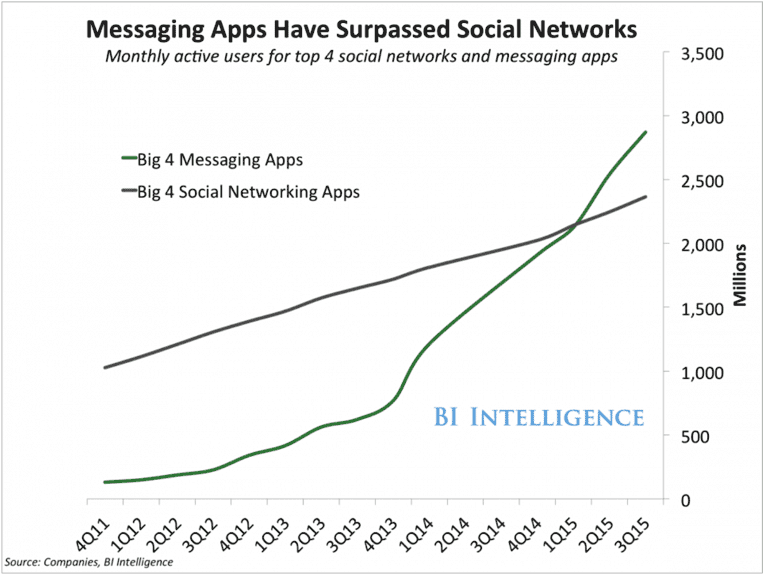
How can you leverage chatbots?
Chatbots can be used in a number of ways to provide a valuable client experience — the biggest benefit? You don’t actually have to monitor the interaction. This means that while you’re in court, meeting with clients, or working on your own business, your chatbot can be working in the background, scheduling consultations and fielding initial questions without you having to ensure that it’s working properly.
Here are a few of the main ways you can leverage chatbots for your firm:
Boost Your Response Time on Facebook
At the most basic level, you can use a chatbot to set up automatic responses on messenger apps like Facebook to let potential clients know you’ll get back to them as soon as possible and provide alternative ways to contact your firm.
While this may not be effective for drawing in new cases, it meets their need for an immediate response while not requiring the effort to set up a fully built out message sequence.
Facebook offers the ability to set up a default response to any incoming message, and you can use this to notify clients of how they can contact your firm (such as including your firm’s phone number or website) in the time between sending the message and when your team can respond on Facebook.

The great thing about instant replies and default replies is that Facebook will enable a response time badge on your business page that shows every visitor that your business has a fast response time, which makes clients more likely to send a message to your business.
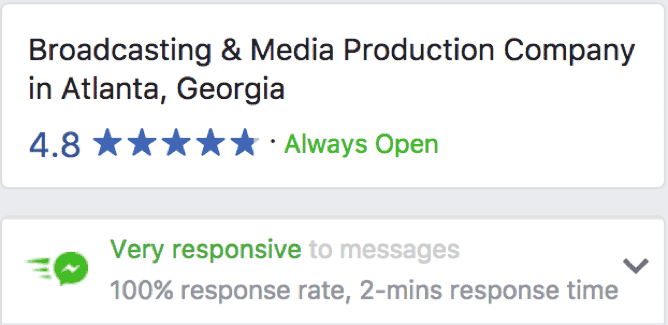
At Crisp, we’ve built a chatbot to interact with our potential clients, but we’ve also enabled instant replies for keywords or messages the bot doesn’t recognize. This allows our page visitors the comfort of knowing we’ll respond as soon as we can while also preventing them from feeling ignored or unheard.
Screen Incoming Leads
A common concern a lot of Facebook advertisers deal with is the quality of incoming leads. While you may have a lot of people messaging your law firm, not everyone is going to be a good fit, so using Facebook chatbots are an ideal way to screen incoming leads to save time you may have otherwise spent communicating with someone who was looking for an entirely different type of service from your law firm.
You can set up a chatbot sequence that guides potential clients through a preliminary sequence to gather more information about their case, and set up keywords such as “car accident”, “DUI”, or other key phrases and actually set up email notifications so you’re notified any time those phrases are mentioned in the conversation.
Moreover, you can subscribe that person to a sequence based on their responses so you can send an automated follow up to them once the conversation is finished. This will bring them into your “ecosystem” and allow you to develop a relationship with them over time, so even if they’re not ready to commit yet, they may be the next time they’re looking for legal services.
Schedule Client Consultations
If you choose to integrate a chatbot into your messenger platforms that acts as more than just an away message, you could easily use this tool as an alternative method for booking in client consultations or case reviews through Facebook.
The easiest way to do this would be to use your messenger to compile the initial data from the client, such as the type of case they need assistance with, basic demographic info, and whatever else you need, before linking them to your booking page – but make sure they don’t have to repeat the same information on the booking page. This increases friction and reduces the likelihood that they’ll book an appointment.
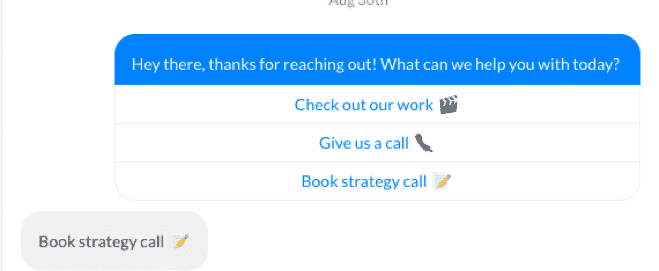
The other way to do this is to set up an integration within your chatbot that actually books the consultation for them, and then syncs with your firm’s calendar.
Granted, this method probably calls for more coding knowledge and probably requires the support of your marketing team, but will create a secondary platform for contacting your firm that meets them where they’re already active. It’s frictionless, will work in real time to find open appointments on your firm’s calendar, and can be a low-cost option for scheduling appointments.
By using pre-established buttons and keywords, your chatbot will walk your client through the booking process and they can schedule a call at the push of a button — no typing required.
Obtain Insights
Many of the more popular chatbots allow your firm the ability to integrate with other CRM software, which means that as soon as someone interacts with your bot, their information can be sent over to your intake software and registered as a lead.
Even if they don’t book a consultation through the bot, you’ll have access to their name and information so your team can follow up with them as needed.
You can also monitor your chatbot to gain valuable information on the audience your page is attracting, which will allow you to develop and improve your firm’s marketing strategy.

For example, you could potentially find answers to questions such as:
- Are more men or women reaching out to my firm?
- What questions do most people have?
- Are they reaching out with specific types of cases?
- What age range is more likely to use our messenger interface?
Once you’ve collected this information, you can create more targeted Facebook ads to this specific audience to compel similar individuals to message your firm on Facebook to book consultations or reach out to your firm.
Send Out Important Announcements
When Facebook began allowing the use of chatbots in 2015, they did so with a specific set of rules to restrict corporations from sending spam to Facebook users. It prohibits chatbots from messaging people who have never interacted with your business and limits the use of promotional messaging unless it fits within certain use cases or time frames.
However, on the flip side of this, Facebook does allow you to send out announcements or broadcasts to anyone who has interacted with your messenger bot. This means that if your firm has released a new blog, video, content piece or promotion, you can send out an announcement to all of your subscribers to let them know.
If you provide a link to the content or allow them to book an appointment directly from the message, it can exponentially enhance client engagement and keep your previous clients or customers up to date with your firm, thereby improving the overall client experience.
Consider this use case: you’re a personal injury attorney who just found out about a potential lawsuit against a corporation for a defective product. You know many of the people in your target audience probably use this product. You could send out a chatbot announcement to all of your subscribers to ask if they’ve interacted with the product, and compel them to reach out to your firm and see if they have a case.
A few use cases of the ways in which entrepreneurs have used chatbots within the legal industry:
- Joshua Browder developed the DoNotPay chatbot to help people fight parking tickets – it’s overturned almost 200,000 parking citations to date
- The Billy Bot connects LinkedIn users to attorneys based on preliminary case information
- Another chatbot allows users to sue Equifax in a class action lawsuit for the recent data breach
Granted, these use cases require more than just a basic knowledge of marketing automation – but, it gives you a glimpse into the expansive world of opportunity present in artificial intelligence in the legal industry. Even the most basic chatbots are cost-effective and call for an immediate response without investing huge amounts of money in traditional advertisements.
Choosing a Chatbot
Whether or not you realize it, you probably interact with a chatbot on a weekly, if not daily, basis. They’re far more conversational than standard automated responses, which allows for more enjoyable conversations than dialing through a series of numbers on a robocall.
They’re faster than emails, easier than phone calls, and allow you the same opportunity for information gathering. 71% of consumers are willing to interact with chatbots because they want information fast. However, while there are millions of people willing to use chatbots, only 5% of companies surveyed in 2016 actively use chatbots in their business. This number is probably even smaller in the legal industry.
Let’s face it — many people consider the legal industry to be out of touch with modern tech advancements, and developing your own messenger bot could be the prime opportunity you need to separate yourself from your competition by making yourself as accessible as possible on any platform.
Popular chatbot builders, which walk you through setting up your sequences and build the bot for you, include ManyChat (which we use at Crisp), Motion AI, Chatfuel, It’s Alive, and more. The chatbot business is booming, so while there are plenty of options for you to choose from, make sure you explore each to find out which works best for your firm, whether it involves:
- Price
- Ease of access
- Integration with other programs
- Required knowledge of coding
The best chatbot platforms offer online tutorials and customer support to make the process easy to use, so before you know it you’ll be on your way to building your own bot!

